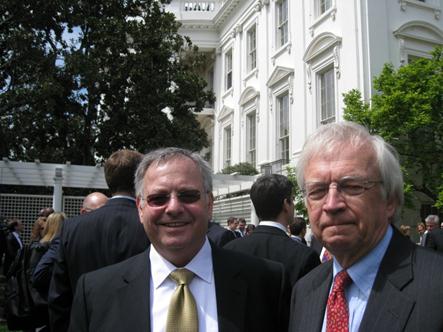I have been asked repeatedly over the last several weeks: “What does the JOBS Act mean for Angels?” In this and other future blog postings, I will give my perspective.
First, what is the JOBS Act? It stands for Jumpstart Our Business Startups Act; it has nothing to do with earlier jobs stimulus efforts other than sharing an acronym. It is a regulatory reform act and does not have any tax elements. The full text can be found at: http://www.govtrack.us/congress/bills/112/hr3606/text (There are other pending legislations that address how to stimulate early-stage company investment through tax incentives.)
Broadly speaking, the JOBS Act is intended to provide more capital to startups that fuel the growth of our economy. It does the following:
- Removes some of the most onerous provisions of Sarbanes-Oxley Bill from emerging growth companies. The argument is that, while large, publicly traded companies needed the extra oversight and transparency, it was never intended to cripple the ability of high-growth startups from tapping the public markets.
- Brings the Securities Act of 1933 into the 21st century by recognizing that markets and communications have changed.
- Potentially allows for the revitalization of Reg A filings as a way for smaller companies to raise money from public markets.
- Enables “Crowdfunding” a way that very early stage startups can get many small investors to stake their company early in the lifecycle of the company.
Much of the attention to the JOBS Act has been focused on the Crowdfunding part, so I’ll address this in this posting. However, the largest impact is likely to be from the other provisions, which will modernize and simplify the operations of Angel financings, small IPOs, etc. I’ll address those in future postings.
Crowdfunding (Title III of the JOBS Act)
In the past, startups were typically initially financed by “friends and family.” There are legendary stories of entrepreneurs mortgaging their homes to start their businesses, and then reaching out to their family, friends, and associates to get the company off the ground. As the original Senate bill said, the decline in home values has caused much of this source of early-stage capital to dry up.
Crowdfunding has precedence. People have contributed small amount of money (via the net) to charities, arts, etc. The music and theatre industries have tapped their fan base to ask for money for new works.
The difference with these precedents and Crowdfunding is the purchase of equity, which has been highly regulated. In the US, only accredited investors (a person with over $200k of annual income or over $1M in net worth; see http://www.sec.gov/answers/accred.htm for the full definition) could invest in highly-speculative private shares. The accredited investors were thought to be sophisticated investors, who could do appropriate diligence on the company and assess the risks. In general, Angels and VCs are the primary investors in this category.
There is still a raging debate on the advisability of allowing less sophisticated investors to enter this asset class. On one hand, the optimists say “why should only the very wealthy be allowed to buy early shares in a company like Facebook?” On the other hand, the pessimists would say, “this is a recipe for fraud; charismatic fraudsters will prey on the unsophisticated investors getting them to invest an amount of money that they can’t afford to lose in companies that don’t really exist.”
The devil will be (to some degree) in the details. The Act calls for a 270 day period for the SEC to write the rules. It also includes some safeguards:
- A company may only raise $1M in a year from Crowdfunding;
- No investor may invest more than $10,000 (or $2,000 if the investor has an income of less than $100k);
- The investment can only be through a registered broker or funding portal;
- A degree of public transparency by publishing the terms of the deal, the basis of the price, cap table, etc. that Angels would typically study;
- Take steps to prohibit “bad actors” from issuing securities using Crowdfunding to help prevent fraud.
This is an experiment that marries the internet, social networking, and modern communications with selling private securities. It could work, it could fizzle, or it could be a great vehicle that tests the innovative spirit of fraudsters. If it works, it could cause thousands of flowers to bloom startups in all parts of the US will have access to capital. If not, we can hope that the SEC regulations will limit the amount of fraud.
Impact on Angels
The simple answer is none of us know exactly. But there are certain things I believe to be absolutely true.
First and foremost, Crowdfunding will only INCREASE the need for angel financing. Very few of our high growth companies will get by on just Crowdfunding. If this is a successful experiment, then more companies will need follow-on financing from Angels.
But, the question is “will angels be willing to invest in a company with potentially hundreds of new, unsophisticated shareholders?” Will the cap table be screwed up? Any good, sophisticated angel knows that valuation is a key to success. My biggest fear is the following scenario:
- Company X at the concept stage has a charismatic CEO with a great vision. He posts a plan and video on a funding portal asking for $1M with a $20M post for common stock at $1 per share. (We all know that it is possible to write a business plan the justifies this!)
- The company then spends the money and makes progress toward a product. It now seeks angel financing for $2M.
- We assess the company, like its prospects, and agree that it is a worthy investment, but assess the appropriate pre-money valuation to be $2M (not $20M) for preferred stock.
- The previous Crowdfunding investor now see their shares valued at less than 10 cents on the dollar. They are very angry.
- This is widely reported in the press and the entire asset class takes a hit.
We have a lot of work to do on Crowdfunding.






